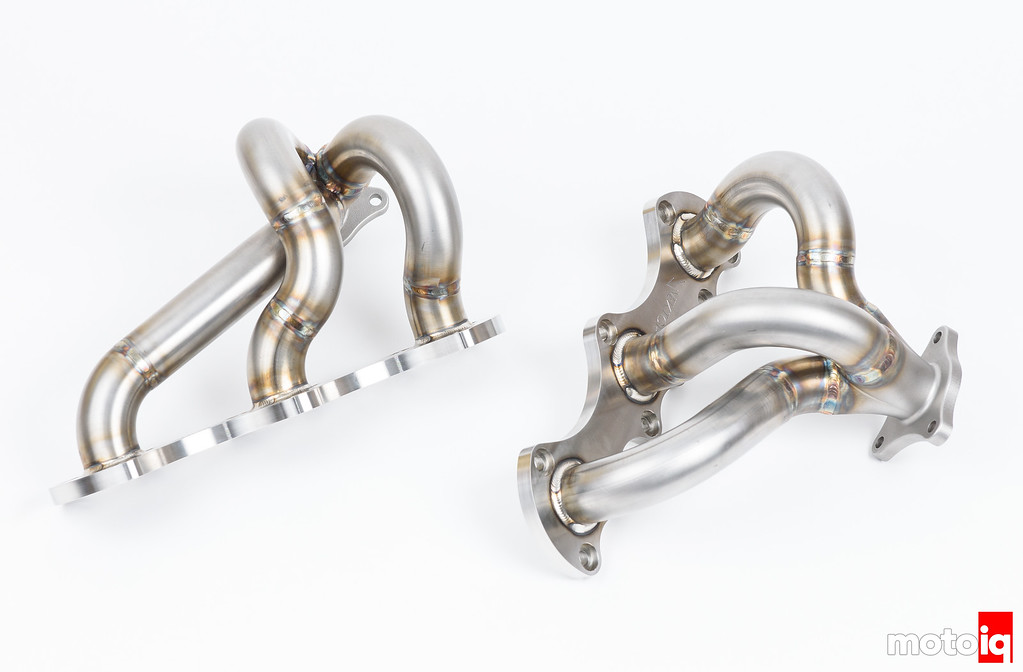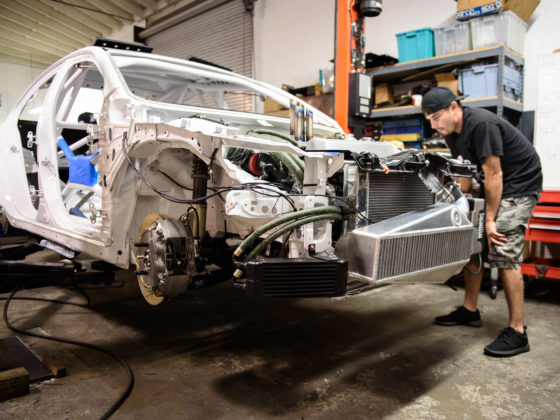
Going back through the data from our AEM CD5 using the AEMData software, we noted that our boost was rising faster with the Vektor Performance header. The quicker boost response was reducing the time to torque from 2.2 seconds to 1.6 seconds, a 30% reduction! A pretty impressive amount and one that does not correlate exactly with dyno charts.

We were quite impressed how one single part could really change the character of a car. The Vektor Performance headers make the car seem much more responsive and willing to rev. They were not any negative attributes to the headers at all. There was a very slight gain in exhaust noise that was hardly noticeable and actually pleasant, more musical sounding.
Strangely we did notice an increase in intake noise, it sounded like the turbos were sucking harder. Since the turbos were spooling sooner, the intake noise was a pleasant sounding by-product of this. The intake noise was somewhat reminiscent of the GT3 RS and its very open ram air system, but not quite that loud.

We would consider the Vektor Performance headers a must have in tuning the 991.2 turbo, Carreras. We have heard that with some bolt on parts and minor tuning that the Carrera can easily match the power output of the vaulted turbo models with reliability for a fraction of the price. We would love to see how these headers enhance these cars performance with a good exhaust system and a Cobb Access port!




6 comments
After admiring Porsche’s from afar for years and pretty much driving every Porsche made from the 60-90’s my thought has always been work harder and save up for the Turbo model. But since every model is now turbo like you point out and with the aftermarket coming to the rescue like these Vecktor headers it doesn’t seem that thought it really as valid anymore. Porsche’s in particular are known to be one of those cars that aftermarket parts often make less hp than stock so it’s great to see the opposite.
The 991.2 turbo is in another world compared to the 991.2 carrera.
You’re going to spend a ton of money to get the 3.0L to the 3.8L level.
I’ve heard from monstaka (french tuner) that catless pipes made a huge difference on their 510hp 991.2 S.
The base Carrera does start $70k below the base Turbo. Suppose you start with the Carrera GTS which has the biggest turbos and is $40k cheaper than a base Turbo. A tune alone on 93 octane bumps up the power 19%, or just short of the Turbo.
The biggest exhaust restrictions on the 911s are the headers and cats. On the stock tune, there’s not much to be gained with an exhaust, but they may be different with a tune. Add in headers to the tune on a GTS and it should be right at Turbo power. So basically for about $5k. Granted, your warranty is probably gone. The GTS does weigh about 200lbs less than the Turbo. Add some high flow cats and intercoolers for even more power. I’d guesstimate another 30whp or so.
I agree, Porsche aftermarket parts, as well as other exotic and semi-exotic cars, often have poorly engineered and validated performance parts that are both expensive and not performance enhancing. Sometimes they are poorly made as well. I have been surprised that the parts for Japanese cars for instance from reputable manufacturers are often made better and perform better. These Vektor Performance headers are impressive however in construction quality, engineering, and performance increase. I would really like to add a cat back and an access port to these. A few tweaks and you could probably get a Carrera to easily give the high buck Turbos and GT3’s the business.
With pure bolt-ons (exhaust, headers, ICs, hybrid turbos), E85, and COBB AccessPort, it’ll do over 600whp. Figure you buy a base model off lease for ~$70k, you can have a 600whp Turbo beating car for under $90k.
From what I understand the engine is very reliable at this power level as well.